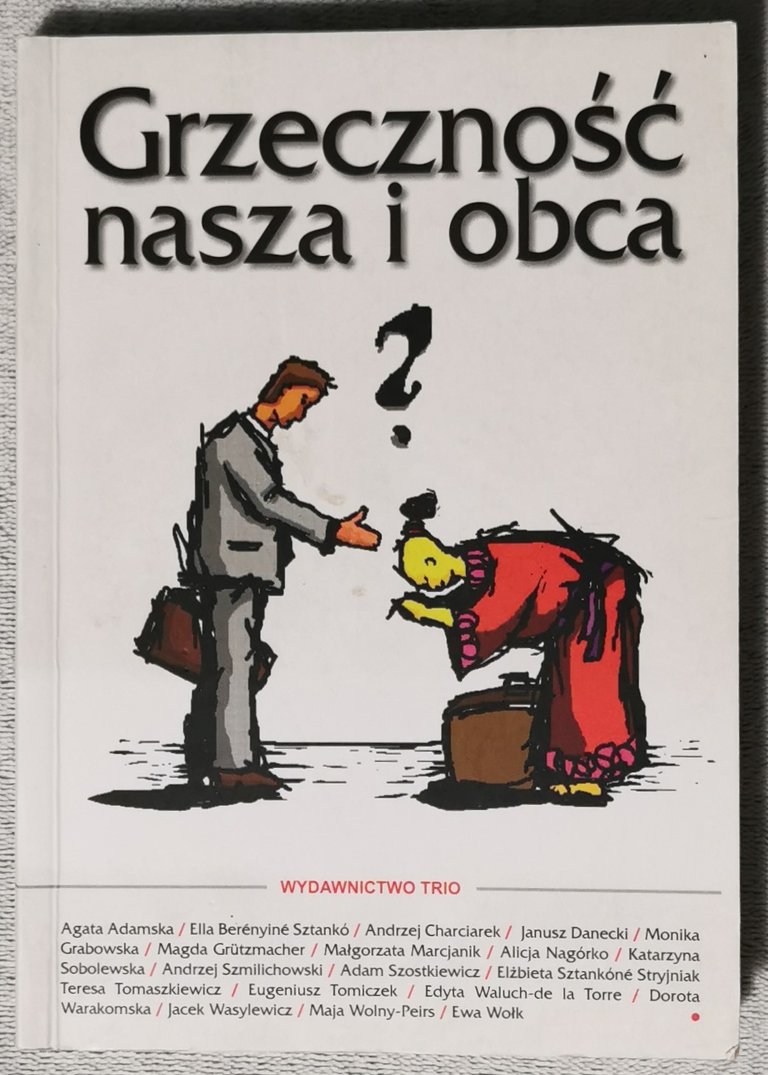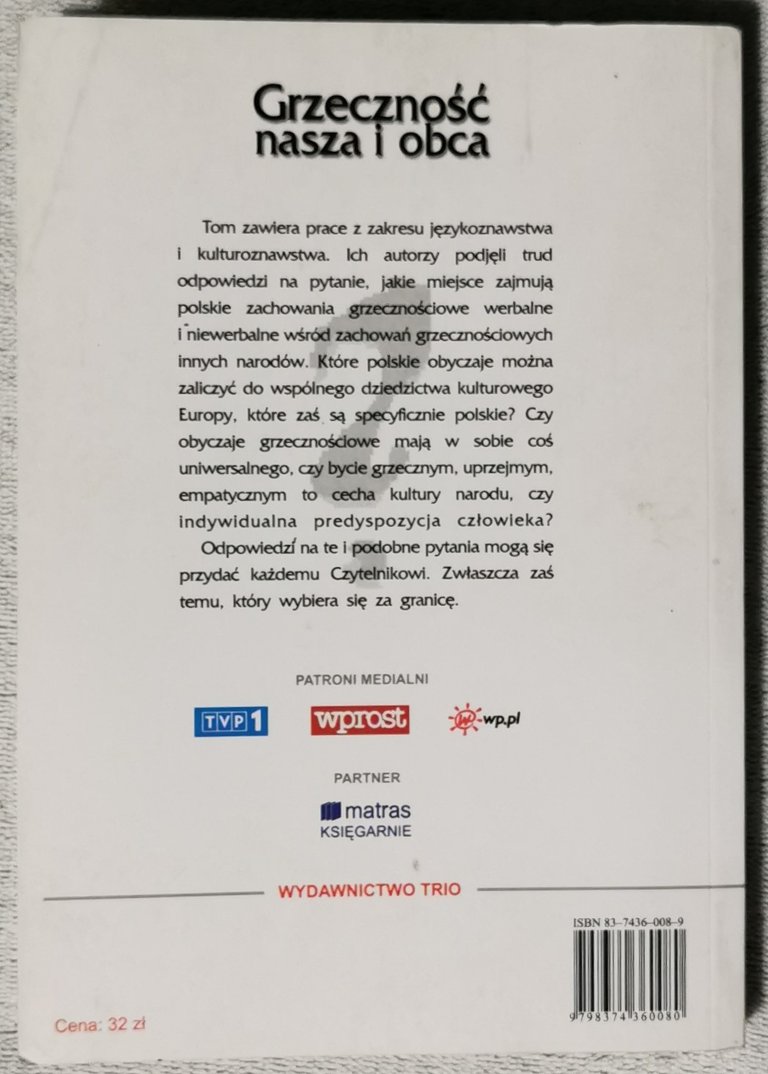[PL/EN] Czytaj z Marcinem 9/2024 - "Grzeczność nasza i obca" ('The Politeness of Ours and Others')

| „Grzeczność nasza i obca” wydawnictwa Trio to bardzo ciekawa publikacja, pozwalająca nam bliżej poznać mentalność i zwyczaje innych narodów – zarówno naszych najbliższych sąsiadów, jak też i mieszkańców krain bardzo odległych. W tym momencie pora na pierwszą uwagę – wśród 16 tekstów znajdziemy zarówno opracowania o charakterze wręcz naukowym, których autorami są kompetentni badacze: profesorowie językoznawstwa lub dziennikarstwa, jak też takie, w przypadku których główną kompetencją autora bądź autorki jest po prostu dłuższy pobyt w danym kraju. Sprawia to, że jakość przedstawianych nam materiałów jest bardzo zmienna, są fragmenty bardzo treściwe, konkretne i pożyteczne, trafiają się też fragmenty zdecydowanie zbyt gawędziarskie, wręcz irytujące. |
'The Politeness of Ours and Others', published by the Trio Publishing House, is a very interesting book that allows us to learn more about the mentality and customs of other nations - both Poland's closest neighbours and the inhabitants of more distant countries. The first thing to note is that among the 16 texts we find both almost scientific works, whose authors are competent researchers: professors of linguistics or journalism, as well as those whose author's main competence is simply a long stay in a given country. As a result, the quality of the material presented varies greatly; there are passages that are very informative, concrete and useful, and there are passages that are far too chatty, even irritating. |
| Do tych pierwszych zdecydowanie można zaliczyć opracowania dotyczące Niemiec, Francji, krajów słowiańskich (Czechy, Rosja, Serbia), Półwyspu Iberyjskiego, krajów arabskich czy Etiopii, do drugich – Holandii, Szwecji i Stanów Zjednoczonych. Inne „odwiedzane” przez czytelnika regiony to Wielka Brytania, Włochy, Belgia i Węgry. W tym momencie należy ze zdumieniem odnotować, że kompletnie (i wbrew okładce!) zaniedbano kontynent azjatycki, podczas gdy omówienie aspektu grzeczności choćby tylko w kulturach chińskiej, japońskiej, koreańskiej i indyjskich, wydaje się wręcz obowiązkowe w takim opracowaniu. To niewątpliwie stanowi całkiem sporą rysę, choć oczywiście nie niweczy wartości książki. |
The first group definitely includes texts on Germany, France, Slavic countries (Czech Republic, Russia, Serbia), the Iberian Peninsula, Arab countries or Ethiopia, while the second group includes texts on the Netherlands, Sweden and the United States. Other regions 'visited' by the reader are the United Kingdom, Italy, Belgium and Hungary. At this point, it is surprising to note that the Asian continent has been completely neglected (contrary to the cover!), whereas a discussion of politeness in Chinese, Japanese, Korean and Indian cultures seems almost obligatory in a study of this kind. There is no doubt that this is a serious omission, although it does not, of course, negate the value of the book. |
| Bo informacje w niej zawarte są, cokolwiek by mówić, ciekawe i wartościowe. Poznamy najpotrzebniejsze zwroty grzecznościowe życia codziennego (nie dotyczy opracowania „węgierskiego” – tu autorka nie pokusiła się o podanie oryginalnych wyrażeń, przytacza tylko ich tłumaczenie na polski), dowiemy się, jak powinniśmy się zachowywać w różnych sytuacjach, w których nawiązujemy kontakt z mieszkańcami danego kraju i pod jakim względem te zasady są różne od tych, w których sami zostaliśmy wychowani. Co powinniśmy robić, a czego unikać, jeśli nie chcemy – w najlepszym razie – zostać uznanymi za prostaka. Oczywiście, lektura książki nie zastąpi nam obycia i doświadczenia, które można nabyć tylko obcując z tubylcami i obserwując ich. Ale powinna pozwolić uniknąć przynajmniej najbardziej niezręcznych gaf, na które moglibyśmy być narażeni. |
This is because the information it contains is, whatever one may say, interesting and valuable. We learn the most necessary phrases of everyday politeness (this does not apply to the "Hungarian" study - here the author did not bother to provide the original expressions, she only quotes their translation into Polish), we learn how we should behave in various situations in which we come into contact with the inhabitants of a given country, and in what respect these rules differ from those by which we ourselves were brought up in Poland. What we should do and what we should avoid doing if we do not want to be seen as - at best - simpletons. Of course, reading a book is no substitute for familiarity and experience, which can only be acquired by interacting with and observing the natives. But it should at least allow us to avoid the most embarrassing faux pas we might encounter. |
| W tym miejscu pora na uwagę numer dwa – książka pochodzi z 2005 roku, co miejscami zdecydowanie daje się odczuć. Pół biedy, gdy chodzi o kwestie związane z rozwojem techniki (Ponieważ współczesna telekomunikacja stwarza nam, jak na razie, możliwość jedynie werbalnego kontaktu z partnerem), względnie z elementami europejskiej, czy wręcz światowej polityki (Pytanie zaś, czy jeśli urząd kanclerza federalnego Niemiec obejmie kobieta, będziemy się do niej zwracać Frau Bundeskanzler, czy też Frau Bundeskanzlerin, pozostawiam na razie bez odpowiedzi). Jako niespecjalnie rażące świadectwo czasów odbierzemy też wypowiedzi na temat feminatywów – tym bardziej, że aktualne tendencje zmian wciąż nie zyskały powszechnej akceptacji. |
At this point, it is time for comment number two - the book dates from 2005, which is certainly noticeable in places. This is not a problem when it comes to technological developments (Because modern telecommunications have so far only allowed us to have verbal contact with our partner) or elements of European or even world politics (The question of whether a woman who becomes Chancellor of Germany will be called Frau Bundeskanzler or Frau Bundeskanzlerin remains unanswered for the time being). Statements about femininatives will also not be seen as a particularly blatant sign of the times - especially as the current trends of change have not yet become generally accepted in Poland. |
| Większym problemem jawi się styl, na jaki możemy się natknąć w esejach gawędziarskich – zdania w rodzaju Nie stoję już więcej jak palant, o suchym pysku nie przystają do książki aspirującej do miana naukowej. Co gorsza, co najmniej jeden z autorów wykazuje się brakiem wrażliwości, który już w tamtych czasach powinien wywoływać niesmak, cóż dopiero dziś. Naprawdę dziwię się, że zarówno recenzent, jak i korektorzy, przepuścili zdania Szwedzi są stale jeszcze narodem stosunkowo czystym genetycznie i dlatego sprawiają złudne pozory inteligencji oraz O piękności kobiet nie ma co mówić – jest najwyższej klasy. Gdy idą sprężyście ulicami, tak jasne, że przejrzyste, a piersi sterczą im jak dwie oznaki za sprawność fizyczną (…). |
A bigger problem is the style of the few chatty essays - sentences like I'm no longer standing around like a jerk with a dry mouth are unbecoming of a book that claims to be scientific. To make matters worse, at least one of the authors displays a lack of sensitivity that should have caused disgust even then, let alone now. I am really surprised that both the reviewer and the proofreaders let pass the sentences The Swedes are still a genetically relatively pure nation and therefore appear deceptively intelligent and There is nothing to say about the beauty of the women - it is first class. When they walk briskly through the streets, so bright that they are transparent, and their breasts stand out like two badges of physical fitness (...). |
| Powyższe zastrzeżenia nie przekreślają jednak wartości całej książki, podobnie jak upływ czasu. Choć dwie dekady są okresem wystarczającym, by zaszły pewne zmiany na płaszczyźnie obyczajowej, większość przekazywanych nam informacji powinna wciąż zachować aktualność, a co za tym idzie – przydatność dla osób ciekawych świata. Uśredniając oceny dla poszczególnych artykułów, dla całości mam ocenę dobrą – 7/10. |
These caveats, however, do not undermine the value of the book as a whole, nor does the passage of time. Although two decades is enough time for some changes to have taken place on a moral level, most of the information we are given should still be up to date and therefore useful to those curious about the world. Taking the average of the ratings for the individual articles, I have a rating of good - 7/10 for the whole. |

0
0
0.000
Hello avtandil!
It's nice to let you know that your article will take 6th place.
Your post is among 15 Best articles voted 7 days ago by the @hive-lu | King Lucoin Curator by polish.hive
You receive 🎖 0.8 unique LUBEST tokens as a reward. You can support Lu world and your curator, then he and you will receive 10x more of the winning token. There is a buyout offer waiting for him on the stock exchange. All you need to do is reblog Daily Report 336 with your winnings.
Buy Lu on the Hive-Engine exchange | World of Lu created by szejq
STOPor to resume write a wordSTART